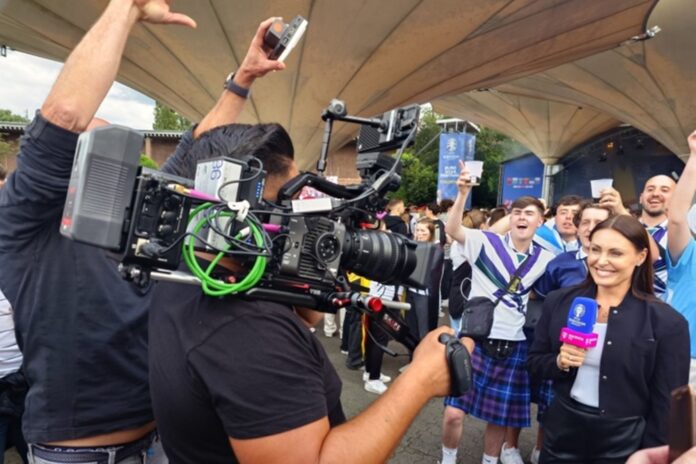Telekom and Sony carries out successful 5G live TV test from the UEFA Euro 2024 fan zone in Cologne
Broadcast continues to decent 5G use case despite remote surgery not taking off. RTL Deutschland’s and n-tv’s coverage of the opening 2024 European Championship match in Munich featured live broadcasts by reporters via Deutsche Telekom’s 5G network. In addition to the live TV, Telekom also set up a 5G campus for RTL. The media company has been also using Telekom’s “Live Video Production” product since last year, which also transmits via the operator’s 5G standalone (SA) network.
Directly next to the RTL media centre in Cologne is one of the official public viewing locations for the European Championship. Thanks to the direct proximity to the transmitter and onwards to Telekom’s campus network, live reports from the fan zone could be sent from that site via 5G. For the coverage, the companies used a new camera system, part of the Networked Live ecosystem, from Sony and Nevion, a Sony Group Company.
In February, Deutsche Telekom and Sony said they had successfully tested Nevion’s VideoIPath media orchestration platform with 5G network Application Programming Interfaces (APIs). The solution from Sony and its subsidiary Nevion uses Deutsche Telekom’s network APIs to make optimum use of the 5G network and offer low latency and reliable bandwidth, which is essential for live, professional video production.
Live Video Production is now regularly used for RTL/n-tv coverage and continues to be booked almost daily during the European Championship.
Parallel streaming
Put together, this system can receive the 5G signal directly via an integrated SIM card and transmit images to the studio in real time without an additional mobile solution. This enabled a high-quality live connection to a reporter in the public viewing zone. The 5G campus network provided the basis for several parallel data streams. Here, too, there were several live broadcasts on n-tv news and for pre-match reporting on MagentaTV.
An RTL team equipped with two mobile 5G cameras has been working at the public viewing spot in Cologne over the last few days. Here they tested four different functions, all of which worked successfully via the 5G connection: Ultra Low Latency Live Video Production; audio intercom for direct communication between the control room, the camera operator, and the interviewer; return video to show the camera operator or interviewer in real time what is currently being broadcast; and remote camera control.
Two Sony FX6 cameras were used for the test, each connected to a CBK-RPU7 HEVC 4K/HD remote production unit for ultra-low latency HEVC video encoding. The encoded outputs were connected to the 5G campus network in the 3.7–3.8GHz frequency range via Sony’s PDT-FP1 Portable Data Transmitter and decoded by an NXL-ME80 processor. RTL’s existing Nevion VideoIPath SDN Control Software System was used to manage the delivery of pictures and sound received via the 5G network into RTL’s SMPTE ST 2110 based IP production infrastructure. Sony’s UWP-D series wireless microphones and receivers were used to ensure high quality sound.



